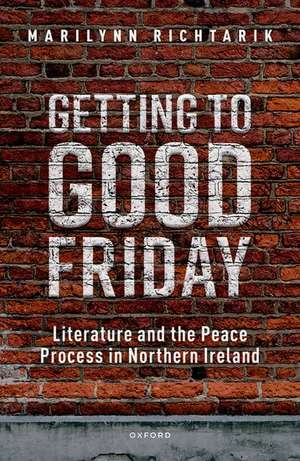Getting to Good Friday: Literature and the Peace Process in Northern Ireland
Autor Marilynn Richtariken Limba Engleză Hardback – 2 feb 2023
Preț: 224.85 lei
Preț vechi: 242.75 lei
-7% Nou
Puncte Express: 337
Preț estimativ în valută:
43.02€ • 44.92$ • 35.61£
43.02€ • 44.92$ • 35.61£
Carte disponibilă
Livrare economică 03-10 martie
Livrare express 27 februarie-05 martie pentru 47.77 lei
Preluare comenzi: 021 569.72.76
Specificații
ISBN-13: 9780192886408
ISBN-10: 0192886401
Pagini: 272
Dimensiuni: 160 x 241 x 19 mm
Greutate: 0.52 kg
Editura: OUP OXFORD
Colecția OUP Oxford
Locul publicării:Oxford, United Kingdom
ISBN-10: 0192886401
Pagini: 272
Dimensiuni: 160 x 241 x 19 mm
Greutate: 0.52 kg
Editura: OUP OXFORD
Colecția OUP Oxford
Locul publicării:Oxford, United Kingdom
Recenzii
Professor Richtarik's book applies her deep knowledge of the psychological and political terrain of Northern Ireland to this empathetic study of a cohort of remarkably talented and closely linked writers. It brings new and arresting insights to the troubled history of the province, its contested cultural paradigms, the pressures which led to the peace process, and the tensions which continue to threaten that achievement.
Getting to Good Friday, a profound meditation on historical and political events and the cultural response of writers, confirms that it is by writing that a refinement in character is possible—and that the best self is the self that writes. In Reading in the Dark, published two years before the Belfast/Good Friday Agreement, Seamus Deane presciently identified the problem of the aftermath: the problem of telling or not telling. Marilynn Richtarik describes the drive towards Good Friday through riveting storytelling, but her detailed attention to creative writers' texts is her finest achievement.
Getting to Good Friday is an important book at a critical time. In arguments about Brexit and the protocol it is sometimes remarked that the people who defend the 1998 agreement never read it ... Getting to Good Friday is a welcome bridge between these sundered generations, made of the words that join them, conditional as they are.
Richtarik shows herself a patient and hardworking researcher... she makes deft use of the huge body of materials documenting the peace process, while creating a remarkably clear and illuminating narrative out of this very tangled tale. We have every reason to be grateful to Marilynn Richtarik for this fine study, exemplary in its scholarship, even-handed, generous and humane in its treatment of literature and politics.
We have every reason to be grateful to Marilynn Richtarik for this fine study, exemplary in its scholarship, even-handed, generous and humane in its treatment of literature and politics.
We have every reason to be grateful to Marilynn Richtarik for this fine study.
Getting to Good Friday, a profound meditation on historical and political events and the cultural response of writers, confirms that it is by writing that a refinement in character is possible—and that the best self is the self that writes. In Reading in the Dark, published two years before the Belfast/Good Friday Agreement, Seamus Deane presciently identified the problem of the aftermath: the problem of telling or not telling. Marilynn Richtarik describes the drive towards Good Friday through riveting storytelling, but her detailed attention to creative writers' texts is her finest achievement.
Getting to Good Friday is an important book at a critical time. In arguments about Brexit and the protocol it is sometimes remarked that the people who defend the 1998 agreement never read it ... Getting to Good Friday is a welcome bridge between these sundered generations, made of the words that join them, conditional as they are.
Richtarik shows herself a patient and hardworking researcher... she makes deft use of the huge body of materials documenting the peace process, while creating a remarkably clear and illuminating narrative out of this very tangled tale. We have every reason to be grateful to Marilynn Richtarik for this fine study, exemplary in its scholarship, even-handed, generous and humane in its treatment of literature and politics.
We have every reason to be grateful to Marilynn Richtarik for this fine study, exemplary in its scholarship, even-handed, generous and humane in its treatment of literature and politics.
We have every reason to be grateful to Marilynn Richtarik for this fine study.
Notă biografică
Marilynn Richtarik was educated at Harvard University, where she earned an undergraduate degree in American History and Literature, and at Oxford University, which she attended as a Rhodes Scholar. Her previous books include Acting Between the Lines: The Field Day Theatre Company and Irish Cultural Politics 1980-1984 (1994), Stewart Parker: A Life (2012), and an edition of Stewart Parker's novel Hopdance (2017). Richtarik is currently a Professor of English at Georgia State University in Atlanta, where she teaches British, Irish, and world literature. She spent the first half of 2017 researching and teaching at Queen's University Belfast as a US Fulbright Scholar.
